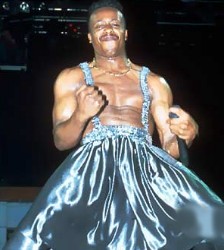The Common Man came across this story while he was researching Mitchell Page last week.
Most of you (well, not Jack Moore or Nick Nelson) remember the heyday of MC Hammer. While not the first mainstream rapper with crossover appeal into pop, he was the most successful. And along with his success, we learned important things about his life. Born Stanley Burrell in Oakland, Hammer got his first job when Oakland A’s owner Charlie O. Finley saw him dancing for money outside the stadium. Finley hired him as a batboy and to entertain the players, and nicknamed him “Hammer” because he supposedly resembled Hank Aaron.
That’s usually where the behind-the-music story of Hammer’s youth ends, and articles continue on to talk about Hammer’s rise in the music industry and subsequent financial difficulties. But the truth is actually more interesting.
Finley was widely famous for, among other things, his hands-on approach to running his baseball team. He did it on a shoestring budget with a skeleton crew in the front office. Charlie Finley was an incredibly frugal man who did not accept wasted effort or resources. Scott Ostler, writing for the Los Angeles Times in August of 1980 ("A's An Odd Setup," August 4), described it:
“There will be no final judgment here as to whether the A’s are the worst-run organization in sports. Ther’s not much dougt, however, that they are the least run. With the A’s, you don’t get a whole lot of bureaucracy. The front office…consists of a vice president, a controller, a farm director, a ticket manager, a director of promotions and group sales, and a public relations director. Ther is one secretary and two switchboard women, who also do secretarial work. That’s nine people, and the A’s have worked with less. Last year there was no full-time PR man or promotions man.”This kind of austerity made Finley wealthy, but it also made him
incredibly unpopular with his players and the fans of Oakland.
 |
| Hammer is on the left. |
“After Burrell turned 16, Finley made him a vice president [actually, Executive Vice President], though his duties were somewhat nebulous. There were rumors that he spied on the players, though this was probably more paranoia than truth. Hammer did phone Finley in Chicago every night from the stadium to broadcast a play-by-play description of the last four or five innings. One night Hammer was allowed to broadcast an inning of a game from Detroit over the A’s regular radio staion, on orders from Finley. The station manager was not happy.”According to Hammer, on an HBO Documentary about sports in Oakland in the 1970s, he also earned the nickname “Pipeline” because everything he heard got related straight to Finley. Burrell left his job with the A's (presumably because he was not legit enough, and therefore had to quit) after he graduated from high school, and eventually joined the Navy for three years. He didn't exactly leave a mark on the game. But still, thus did MC Hammer become one of the first African-Americans to be an executive of a Major League Baseball team.



4 comments:
Perhaps he was perfectly legit, but realized he wasn't working hard...and therefore might as well quit.
Nice try, but a lot of mis information and quotes that are not correct. It's always interesting to see revisionist or someone's perspective or story telling on actual historical facts. I was never an official batboy. That was my brother Chris. I worked in the front office from day one. I only helped out as a batboy if a kid got sick once or twice a year. There is a ton more to correct but it's lengthy ...
If indeed you are who you say you are, Mr. Hammer (and, really, The Common Man hopes that you are), TCM is only quoting a newspaper account from 1980 and various media reports about you (such as this 1990 profile of you in Jet. This was not meant to minimize your efforts on behalf of the A's, but to explore how deep your role was in Oakland.
Seriously would welcome the opportunity to set the record straight regarding your time with the A's, your relationship with one of baseball's icons in Charlie Finley, and your thoughts about the A's today. But there's no way TCM is lucky enough to actually have MC Hammer commenting on his blog.
If the 1970s Oakland A's had never happened, no scriptwriter would ever have been able to write their story, let alone sell it. Lord Byron was right: Truth really is stranger than fiction.
The irony is, the one thing Finley SHOULD have told the proto-Hammer was how to manage money better. No wonder Hammer became a minister: Spending that much time with Finley would make anyone start searching for a higher power, and I don't mean Bowie Kuhn!
Post a Comment